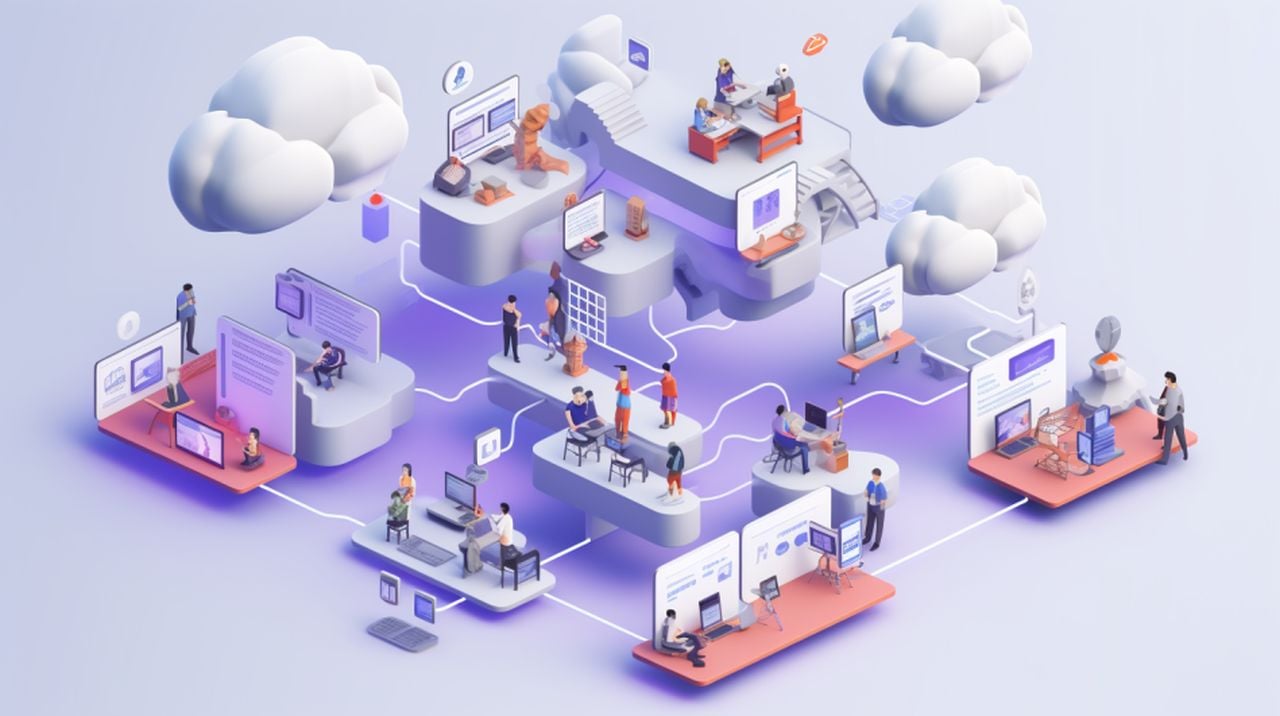Understanding the pivotal role that generative AI is currently offering business and it’s future transformations is crucial to stay ahead of your competition. Alan Turing might have laid the theoretical groundwork years ago, but today’s AI technologies, particularly large language models (LLMs), are reshaping how businesses operate, strategize, and interact with customers, employees and stakeholders.
These are computational structures that can understand and generate human-like text such as the widely known OpenAI ChatGPT AI model. They are unique because they are not only capable of simple tasks, like answering queries, but also complex ones, such as drafting emails or even generating reports. Powered by foundational models, these LLMs can be tailored to specific corporate needs, essentially acting as a force multiplier for human effort.
Applications of generative AI in business
You may wonder how this pertains to your bottom line. These models have cross-functional applications that can optimize a range of processes from customer service and HR management to data analysis and market research. AI-driven chatbots can handle a multitude of customer queries simultaneously, thus freeing your customer service team to focus on more complex tasks that require human nuance and judgement.
IBM generative AI in business
But the story doesn’t end with mere task automation. Advanced LLMs are now capable of extracting actionable insights from large data sets, something that was traditionally a labor-intensive activity. This drastically reduces the time and effort needed for market research, allowing for faster decision-making cycles. If agility and data-driven strategies are high on your corporate agenda, the capabilities of these models can be a significant asset.
Beyond the straightforward applications such as automating customer service or streamlining inventory management, AI offers a range of sophisticated advantages for businesses:
Predictive Maintenance
In industries like manufacturing and utilities where machinery is the backbone of operations, the cost of unplanned downtime can be astronomical. Predictive maintenance leverages machine learning algorithms to analyze data from sensors placed on equipment. These algorithms use historical and real-time data to predict when a machine is likely to fail. This allows companies to perform maintenance only when needed, rather than on a set schedule, ultimately minimizing downtime and saving resources.
Emotional Analysis
Understanding customer sentiment has always been crucial for brand success, but AI takes it a step further by quantifying emotions. Advanced algorithms analyze text from customer reviews, intonation in voice recordings, and even facial expressions in videos to gauge how customers truly feel about a product or service. This real-time emotional analysis can inform everything from product design to advertising strategy, enabling businesses to pivot or double down on tactics with unprecedented agility.
Supply Chain Optimization
Modern supply chains are complex networks that are vulnerable to a host of unpredictable variables, from weather disruptions to political instability. Traditional models for supply chain management struggle to account for these variables in real-time. However, AI algorithms can dynamically adjust supply chain operations by considering multiple factors such as weather forecasts, geopolitical news, or even social media sentiment. This allows businesses to preemptively address issues, reroute supplies, or adjust production levels, ultimately creating a more efficient and cost-effective supply chain.
Fraud Detection
Financial fraud is an ongoing challenge for businesses and requires constant vigilance. Deep learning algorithms excel at identifying fraudulent activities by detecting complex, non-linear patterns within large datasets, which may be imperceptible to humans or simpler algorithms. Importantly, these models can adapt to emerging fraud tactics, continually learning from new data and improving their detection capabilities. This dynamic adaptation ensures that the system stays ahead of would-be fraudsters, protecting both the business and its customers.
Talent Retention
Employee turnover can be a significant cost for businesses, both in terms of recruitment expenses and lost institutional knowledge. AI can help mitigate this by analyzing indicators of employee satisfaction or dissatisfaction. For example, natural language processing can be used to assess the sentiment of emails or Slack messages, while patterns in leave requests or even biometric data (like badge swipes at the office) can offer additional clues. These insights enable HR departments to proactively address issues, perhaps by opening dialogues with employees who seem disengaged, thereby increasing the chances of retaining valuable staff.
Algorithmic Trading
The financial markets are a high-stakes environment where milliseconds can mean the difference between profit and loss. Advanced machine learning models can analyze vast amounts of market data in real-time, making predictions and executing trades at a speed no human could match. These algorithms can also adapt to changing market conditions, learning from their mistakes and successes to continually refine their trading strategies. This opens up new avenues for profit, although it also necessitates careful oversight to minimize risk.
Automated Content Creation
The power of AI to generate text-based content like reports, white papers, or even news articles is a substantial asset to companies. Think of industries where analytical reports are essential—like finance or healthcare. Automated AI tools can synthesize data into comprehensive reports in a fraction of the time it would take a human. This doesn’t eliminate the need for human insight; rather, it frees professionals to focus on higher-level interpretation and strategic planning, maximizing the utility of human capital.
Customer Segmentation
In a world saturated with data, targeting the right customer has never been more crucial or complicated. AI’s power of unsupervised learning identifies patterns in customer behavior or other metrics, creating clusters of similar customers. This highly targeted segmentation enables tailored marketing campaigns that resonate more strongly with individual consumer groups, leading to better customer acquisition and retention rates.
Ethical Decision-making
Ethics is gaining importance in business practices, and AI is stepping in to facilitate this. Special algorithms can be trained to flag potential ethical or compliance-related issues in data sets or ongoing projects. For instance, a pharmaceutical company could train an AI to alert them if clinical trials appear to exclude marginalized communities, thereby promoting inclusivity and ethical responsibility.
Sustainability Management
Sustainability is not just a buzzword; it’s becoming a core part of business strategies. AI can be configured to manage energy use across company facilities in real time, not only reducing operational costs but also contributing to environmental sustainability. This could be particularly impactful in industries with massive carbon footprints, like manufacturing and logistics.
Strategic Market Entry
AI’s capability to sift through massive global datasets—ranging from consumer behavior, regulatory landscapes, to economic indicators—can pinpoint where a company should consider expanding its operations. Rather than relying on traditional market research, which could take months or even years, AI provides actionable insights more quickly and possibly more accurately.
Mergers and Acquisitions Analysis
The success of an M&A deal depends on an intricate web of factors, many of which are hard to quantify. AI can evaluate extensive financial and non-financial datasets to predict the success of potential M&A deals. This extends beyond just looking at balance sheets to include variables like employee sentiment, brand compatibility, and even social media sentiment.
Real-time Language Translation
In a globalized world, language barriers can still impede business growth. AI-driven translation tools offer real-time solutions for overcoming this obstacle. Imagine a virtual business meeting where participants speak different languages. Real-time AI-powered translation can make the conversation seamless, bridging the language gap instantaneously.
Biometric Security
Security measures have moved far beyond passwords and firewalls. Advanced AI algorithms are now capable of recognizing unique human characteristics, like retina patterns or the way someone walks (gait analysis), offering highly secure yet non-intrusive methods of authentication.
Augmented Reality for Training
In high-stakes fields like healthcare and aviation, training is both critical and costly. AI-driven Augmented Reality (AR) can simulate realistic scenarios where employees can practice without risk. For instance, medical professionals could use AR to simulate surgeries, allowing them to hone their skills in a risk-free environment.
Ethical considerations
However, like any powerful tool, generative AI comes with its own set of ethical questions that corporate leadership should consider:
- How transparent is the decision-making process of these models?
- What steps are being taken to ensure that data privacy norms are upheld?
- What contingencies are in place for unintended consequences, like algorithmic biases?
Data protection and ethical governance are not just buzzwords; they are foundational elements that ensure the responsible use of AI in a corporate context. As AI systems are primarily as good as the data they’re trained on, it’s crucial that issues related to data privacy and security are at the forefront of any AI deployment strategy.
As AI becomes more entwined with business processes, an understanding of its capabilities, limitations, and ethical implications is not just an intellectual exercise but a business imperative. Generative AI, particularly large language models, offer unparalleled advantages for businesses and strategic agility. Yet, these advancements should be tempered with an ethical framework that ensures responsible usage and safeguards against potential pitfalls.
Filed Under: Guides, Top News
Latest aboutworldnews Deals
Disclosure: Some of our articles include affiliate links. If you buy something through one of these links, aboutworldnews may earn an affiliate commission. Learn about our Disclosure Policy.






